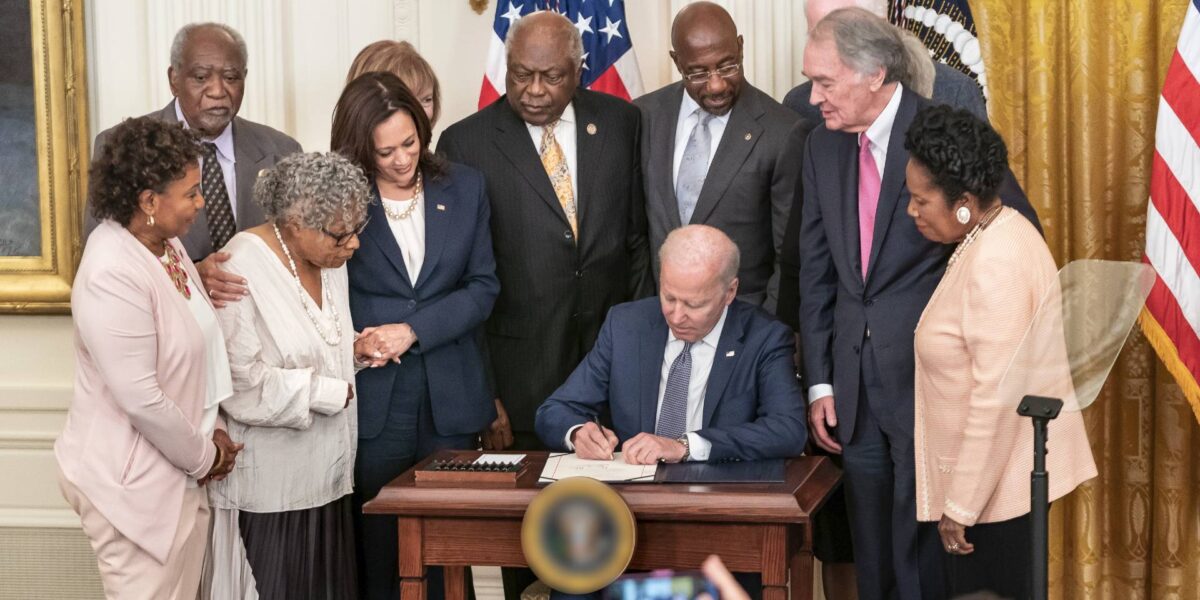On Monday, June 19, millions of Americans will celebrate the country’s newest national holiday — Juneteenth.
While celebrations are being planned across the nation, the holiday’s origins in Texas come as state Governor Greg Abbott ramps up efforts to ban books in classrooms, prohibit diversity, equity and inclusion offices at state-funded colleges and universities, and eliminate critical race theory in universities.
Juneteenth, which has been celebrated by Black Americans since 1866, was finally introduced as a federal holiday in 2021.
All 50 states recognize Juneteenth as a holiday or observance, but only 22 states have made the event a legal holiday (one that would be permanently paid).
The history of emancipation and abolition
Known officially as Juneteenth National Independence Day, the holiday commemorates the emancipation of enslaved African Americans.
The Emancipation Proclamation was signed by President Abraham Lincoln in September 1862, with the new law taking effect on January 1, 1863.
The Proclamation represented Lincoln’s effort to free enslaved African Americans in Southern states of the Confederacy, including Texas.
Those who were enslaved in Delaware and Kentucky were not freed until the 13th Amendment, which abolished chattel slavery in the United States, was ratified in December 1865.
Despite being included in the Proclamation, Texas failed to enforce it and enslavement continued unlawfully. The lack of enforcement only prolonged the human rights violations suffered by Black people in Texas.
While the holiday celebrates African American culture in a broad sense, understanding its Texan roots is essential to understand the historical significance of Juneteenth. By 1865, as many as 250,000 Black people experienced enslavement in the state of Texas.
On June 19, 1865, U.S. Major General Gordon Granger traveled to Texas where he announced the end of the Civil War and the end of slavery.
Sure, that is where Juneteenth gets its name, but the idea that June 19 marked the day all the quarter-million enslaved African-Americans in Texas were freed is nothing more than fiction.
In order to scare those who were enslaved into submission, white enslavers in Texas murdered those who dared to argue that their enslavement was unconstitutional. Between 1865 and 1868, white Texans killed 1,000 Black people.
Others waited until the harvest season was completed before letting those who were enslaved go, and some held out even longer in hopes of overturning the 13th Amerndment.
Captors were able to continue enslaving African-Americans under the guise of “equality.”
“The Freedmen are advised to remain at their present homes and work for wages,” Granger said at the time. “They are informed that they will not be allowed to collect at military posts; and they will not be supported in idleness either there or elsewhere.”
White House whitewashes Juneteenth’s legacy?
The history of Juneteenth makes it all the more troubling that a White House video shared to social media commemorating the holiday failed to mention Texas or even enslavement.
The holiday, which gives African-Americans a shared day off to “celebrate” the end of slavery, is taking place as police continue gunning down and incarcerating Black people, as Black women continue to die disproportionately during childbirth, and as voter suppression efforts threaten the political participation of Black Americans in the country’s elections.
As New York State Health Commissioner Dr. James McDonald said in a Friday statement, the commemoration of Juneteenth requires Americans to double down on their commitment to “fight structural racism and deeply focus on health equity.”
“Juneteenth is not only a time to celebrate, but to acknowledge the injustices and socioeconomic disadvantages endured by generations of Americans descended from enslaved people,” McDonald said.
He pointed to the legacy of redlining — the discriminatory practice of denying or limiting financial services like mortgages to prospective homeowners who were Black — along with limited educational and economic opportunities, and environmental hazards have left Black Americans at a higher risk of “virtually every noncommunicable disease.”
Calling the move to declare Juneteenth a national holiday “one of my proudest actions as President,” Biden characterized the Day of Observance in his Friday Proclamation as a commemoration to “America’s dedication to the cause of freedom.”
He also referred to the “tireless work of abolitionists who made it their mission to deliver the promise of America for all Americans.” Biden went on to invoke former State Representative Al Edwards, who wrote the bill that made Texas the first state to recognize Juneteenth as a holiday.
The president called on all Americans to “acknowledge and condemn” the country’s history of enslavement, while recognizing “the impact of America’s original sin remains.”
Biden pointed to a number of initiatives his administration has achieved — cutting Black child poverty in half, nominating the first Black woman to sit on the U.S. Supreme Court, and hitting record low unemployment rates for Black Americans — as reasons to celebrate this Juneteenth.
“In this Administration, we make it clear that history matters,” Biden said. “Black history and Black stories will not be erased, denied, or banned from our Nation’s conscience no matter how hard people may try.”



